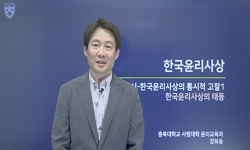The term “mundane realm” (世間) refers to the space in which sentient beings abide. This mundane realm has been regarded as an obstacle to be avoided and overcome. As Mahayana Buddhism spread, however, buddhas and bodhisattvas were venerated as ...
http://chineseinput.net/에서 pinyin(병음)방식으로 중국어를 변환할 수 있습니다.
변환된 중국어를 복사하여 사용하시면 됩니다.
- 中文 을 입력하시려면 zhongwen을 입력하시고 space를누르시면됩니다.
- 北京 을 입력하시려면 beijing을 입력하시고 space를 누르시면 됩니다.

원효의 세간관 고찰 - 『열반종요』를 중심으로 - = A Study of Wonhyo`s View of the Mundane Realm as Represented in the Yeolban jongyo
한글로보기https://www.riss.kr/link?id=A102090573
- 저자
- 발행기관
- 학술지명
- 권호사항
-
발행연도
2016
-
작성언어
-
- 주제어
-
KDC
200
-
등재정보
KCI등재
-
자료형태
학술저널
-
수록면
101-131(31쪽)
- 제공처
- 소장기관
-
0
상세조회 -
0
다운로드
부가정보
다국어 초록 (Multilingual Abstract)
The term “mundane realm” (世間) refers to the space in which sentient beings abide. This mundane realm has been regarded as an obstacle to be avoided and overcome. As Mahayana Buddhism spread, however, buddhas and bodhisattvas were venerated as the ones who abide in that realm and have a thorough insight into it without being defiled by it. This respect for them then led to the notion of “supra - supra mundane,” which mandates practitioners to transfer their merits to the mundane realm without being stuck in the pursuit of the “supramundane.” Such a change in the viewpoint of the mundane realm was brought by emptiness thought, which criticized discrimination between the mundane and the supramundane, and also by tathagata - garbha thought, which emphasized universality of buddha nature. Wonhyo (617~686), who is well known for his unhindered act, laid firm doctrinal foundations for the notion of “supra - supra mundane.” Influenced by the scholarship of the Dilun master Huiyan (523~592), he identified the intellectual hindrance, mentioned in the Awakening of Mahayana Faith, as the fundamental ignorance which discriminates the mundane from the supramundane. Such an attitude is also discernible in his Yeolban Jongyo (Thematic Essentials of the Nirvana Sutra). In this book he does not consider the nirvana without remainder to be an extinction of mind and body; he identified it as a unity of a sentient being`s thusness with the dharma-body of buddhas. He also criticizes the Hinayana attachment to the nirvana without remainder and upholds the idea of the nirvana with remainder, which underscores active involvement in the mundane realm. He finally emphasized the nirvana without any attachment to the abiding place. His view of nirvana is closely related to his life which recognized the value of the mundane realm and actively edified worldly people.
동일학술지(권/호) 다른 논문
-
- 한국불교선리연구원
- 양은용 ( Yang Eun Yong )
- 2016
- KCI등재
-
- 한국불교선리연구원
- 정성준 ( Cheong Seong-joon )
- 2016
- KCI등재
-
「선문청규(禪門淸規)」의 교단사적 의의(意義)와 승려의 역할
- 한국불교선리연구원
- 차차석 ( Cha Cha Seok )
- 2016
- KCI등재
-
『시용향악보』 소재 <내당>·<삼성대왕>의 불교적 성격과 연원
- 한국불교선리연구원
- 나정순 ( Na Jung Soon )
- 2016
- KCI등재




 KCI
KCI KISS
KISS





